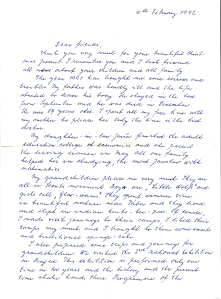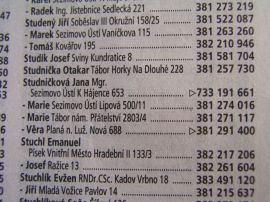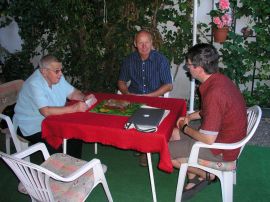Sonia and I recently visited the city of Tábor in the South Bohemia region of the Czech Republic. My maternal grandfather’s family (with the surname Klinke) emigrated from Tábor to the United States sometime in the 19th century.
Tábor has been through a lot in the past two thousand years. The Celts established a settlement in Tábor around 100 B.C. and portions of existing buildings and the castle date to the 13th and 14th centuries.
The Protestant and Catholic armies fought here during much of the 15th century. The Swedes invaded in the 17th century during the Thirty Years War. Until World War I, the country was under the control of the Austrian Empire. In 1918, following World War I, the Czech and Slovak peoples were united as one country called “Czechoslovakia.” During World War II the Nazis invaded. Then in 1968, the Soviet Union invaded Czechoslovakia and didn’t leave until 1989.
KLINKE
In 1966, in the middle of the Cold War, my mother and grandmother had visited Tábor in search of their Klinke clanmates.
At the tail end of their visit, they encountered some problem with their train tickets and had difficulties at the train station getting it resolved due to the language barrier. Eventually, they were assisted by the station master, Otakar Studnicka. Otakar not only got them onto their train, he also took the liberty of upgrading their seats to first class.
After returning to the U.S., my mother sent a thank you note to Otakar at the station. He replied back at the holidays with a card.
That began a written correspondence that lasted over 25 years.
At Christmas, the families would exchange letters and gifts. It was always exciting to open the package from Tábor containing assorted calendars, children’s books, dried mushrooms, handmade lace, tablecloths and ornaments.
My mother showed us some of the items when we visited Sandusky before leaving on our trip.
My mother would send them clothing in return: jeans, tee shirts, etc. for their children.
My mother has saved many of the letters. Otakar would write about the news from his family and daily life in Tábor with the Soviets. The correspondence continued until 1985 when my mother was notified by Otakar’s wife, Maria Studnickova, that he had died unexpectedly.
My mother continued exchanging letters with Maria until 1992. This correspondence of more than 25 years had spanned the entire Soviet occupation of Czechoslovakia. Maria and my mother have never met in person.
I had visited Prague in 2004 and decided not to make a side trip to Tábor because I assumed that after such a difficult history there wouldn’t be much left of the city worth seeing.
However, Sonia talked me into visiting Tábor on our current trip. I remained doubtful that we would find much of interest there.
We walked out of the Tábor train station and into the Old Town. OMG!
The city was very nice and the old town amazingly beautiful. The medieval-era buildings were being well cared for. I could have written an entire post just about the buildings.
When we checked into our B&B, I checked the local telephone book for evidence of any Klinkes (or surname variants, e.g. Klinkova, Klinek, Klinka, Klika, etc.) without any success.
I then looked in the telephone book for listings for Maria (Marie) Studnickova.
Sonia asked the B&B proprietor to help us contact her, explaining the background of our relationship.
In the early evening, we were taking a nap when there was a knock at the door. The B&B proprietor excitedly told us, “They’re here!”
The “reunion” with Maria and her son, Otakar, was fairly emotional. They said that it was an incredible shock and happy surprise to hear that we were in town.
Maria and Otakar very friendly and curious. Maria retired from the flower shop 25 years ago, but still lends them a hand every year to meet the huge demand for grave flowers around All Souls Day in November. She lives in the same house that she shared with her husband.
This is an important year for the Studnickova family; both of her son Otakar’s children are getting married and Maria celebrated her 80th birthday. Maria is in charge of the flowers at the weddings.

Maria with the wedding bouquet she made for her grandchild's wedding. She grew the sunflowers herself.
She speaks little English so her son interpreted for us. She told us that the letters that she had sent after her husband died were translated into English by her children.
We showed her images on the laptop of some of the letters that she had sent – including some recipes and hand drawn sketches of how to correctly form cookies into traditional shapes. Maria then reached into her pocket and produced the wedding photos of my parents that my mother had sent her. It was amazing to be sitting at a table in a Czech town that we had never visited, and be looking at pictures of my family.
Maria and Otakar invited us to dinner at a restaurant in the town square. We talked about their family, the town and the transition to life after communism in the early 1990s. Private property (factories, farms, etc.) were slowly returned to the original owners – although often in much neglected condition.
Sonia and I didn’t turn up any lost Klinkes in Tábor, but we made some new friends that I felt like I had already known for a very long time.
THE END
P.S. Keep sending us those postcard requests!



















I love, love, love this story! I told Mom she should submit it to a magazine. And yes, I remember the year we received those mushrooms at Christmas!!! 🙂